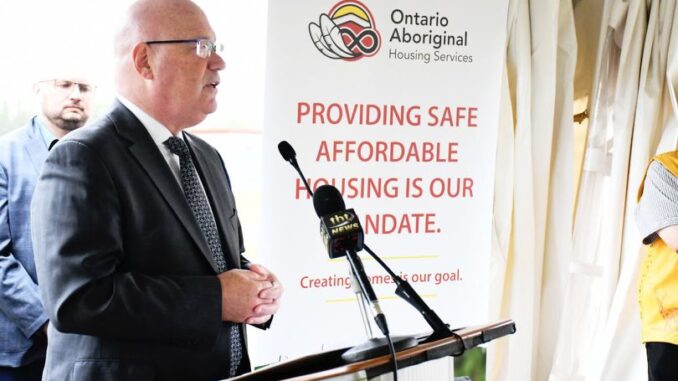
Thunder Bay — The Ontario government is providing $8.7 million through the Indigenous Supportive Housing Program (ISHP) to help create 58 transitional housing units for youth in Thunder Bay.
The new three-storey building, managed by the Thunder Bay Indigenous Friendship Centre, has a total of 58 units and will offer transitional housing units for Indigenous youth. It includes single and pod style accommodations. Residents will be living and dining with a communal teaching kitchen. Participants will be supported with 24-hour youth workers and full-time case managers and services will include enhancement of community and relationship building, life skills development, employment, or education.
The funding was announced by Steve Clark, the Minister of Municipal Affairs and Housing, and Kevin Holland, Member of Provincial Parliament for Thunder Bay – Atikokan.
“Our government is going to keep fighting to get shovels in the ground so all Ontarians can find a home that meets their unique needs,” said Steve Clark, Minister of Municipal Affairs and Housing. “I’m pleased to see this investment through the Indigenous Supportive Housing Program being put to work to create safe, accessible homes for youth in Thunder Bay, and I’d like to thank MPP Holland for his continued advocacy at Queen’s Park on behalf of his community.”
The Ontario government is investing an additional $202 million each year in provincial homelessness prevention programs, bringing Ontario’s total yearly investment to close to $700 million. This includes an increase of nearly $11 million through the Homelessness Prevention Program for Thunder Bay, for a total of $16.5 million annually. The province has increased annual funding for the Indigenous Supportive Housing Program by $11.5 million (or 38%) for a total of $41.5 million.
Quick Facts
- Through the Homelessness Prevention Program and Indigenous Supportive Housing Program, Service managers and Indigenous program administrators have the flexibility to allocate provincial funding to programs and services that address and prevent homelessness in their communities, such as rent supplements, homeless shelters, and supportive housing including capital projects.
Quotes
“Today’s announcement is another great example of our government’s commitment to Thunder Bay, and I appreciate the continued investments Minister Clark’s ministry is making in our region. We’re going to keep fighting to support jobs, homes and prosperity across Northern Ontario, to ensure no part of the province is left behind.”
– Kevin Holland
MPP for Thunder Bay-Atikokan
“The importance of this transitional housing project that will serve the youth of Thunder Bay and region cannot be overstated. We thank Minister Clark for this historic investment of 8.7 million dollars, Justin Marchand, CEO of Ontario Aboriginal Housing Services for his vision and determination, The Metis Nation of Ontario and the Ontario Native Women’s association for the delivery of these vital trauma informed wrap around services.”
– Mayor Ken Boshcoff
City of Thunder Bay
“We are grateful for the support of the Ministry of Municipal Affairs and Housing to enable to Thunder Bay Indigenous Friendship Centre to provide safe and welcoming home to Indigenous youth who are at risk of homelessness. Our vision is to help our youth heal by sharing traditional and cultural healing practices, and by providing life-journey supports that align with the Seven Grandfather Teachings. We are excited to work within our community, and with our partners to provide health and wellness services that look after our mind, body, and spirit, and enrich all our lives. Chi-Miigwetch!”
– Charlene Baglien
Executive Director, Thunder Bay Indigenous Friendship Centre
“Ontario Aboriginal Housing Services (OAHS) is honoured to be a part of this development and being part of a shared commitment in fostering a brighter future for Indigenous youth. This endeavor not only embodies a physical space, but a profound promise of empowerment, growth, and resilience. This development will be a beacon of hope, echoing the resounding belief that together, we can cultivate lasting, positive change.”
– Cora McGuire-Cyrette
Board Chair of the Ontario Aboriginal Housing Services
“Today’s announcement is a significant step towards compassion, understanding, and empowerment for Indigenous youth at risk of homelessness. The Junot Avenue Indigenous Youth Transition House Project will serve vulnerable youth grappling with housing instability — who rightfully deserve a chance at recovery, healing, and a brighter future. Having the Métis Nation of Ontario play a role in this project alongside dedicated community partners fills me with pride and optimism for what we will be able to accomplish with the recognition of our self-government.”
– Margaret Froh
President of the Métis Nation of Ontario
SOURCE: Province of Ontario

Leave a Reply